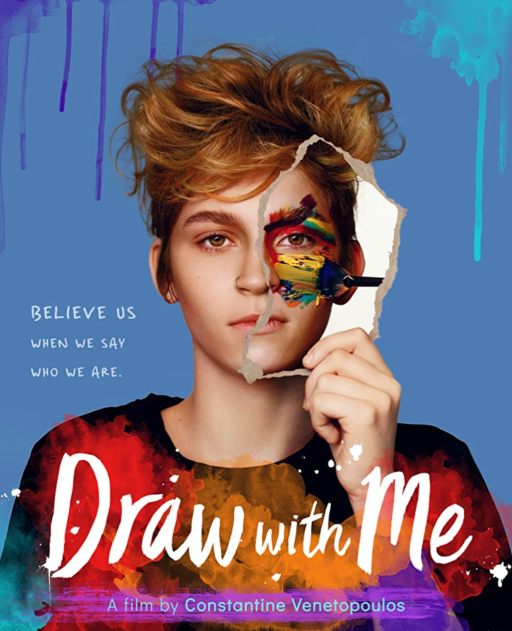Short film “Draw with me” shows painfully well the struggles, big and small, in the young transgender’s path to self-actualization
Be yourself. The world will adjust (Manabi Bandyopadhyay, professor and first transgender person in India to complete their Doctorate of Philosophy)
Accepting change. Believing in someone. Recognizing identity. This is the way it should always have been, but now is the time. We must learn to live in an age of acceptance.
“Draw with Me” is a new documentary short film from director Constantine Venetopoulos that examines the coming out journey of Brendon Scholl, a teenager who identifies as transgender and uses the them/they/their pronouns.
As everyone’s journey is unique, the film focuses on how Brendon uses art as a powerful form of self-expression and inner truth.
After facing their mother and father once their binder (a piece of clothing that makes your chest look flat) is found in the laundry, Brendon found the courage to tell their parents the truth. They want to be identified as a boy.
Both of their parents speak frankly about when they were confronted with their new reality. Brendon’s father was in shock but did not really speak about it. As Brendon says their father went into “radio silence” while mother asked, “Well, don’t you want to be a girl?” and went into another room to cry.
I imagine it is hard for parents of transgendered people at first to accept the change in their children. This film allows Brendon’s parents to speak honestly about how they both reacted, and the reactions certainly don’t sugarcoat their immediate responses at the time. The parents bare their soul, as Brendon did before them.
But Brendon’s coming out was also their parents’ chance to reach deep inside for acceptance. It is quite beautiful to see a mother and father let themselves be a part of that change so that Brendon can grow into their stronger self.
Brendon speaks honestly about their journey and dealing with a world that is not immediately welcome to change. They explain how their very existence is political and the stress of having to explain definitions to so many on an almost daily basis. It is already hard enough finding your way as a teenager but to be constantly misgendered makes it an almost impossible world to navigate.
Jennifer Lopez (the film’s producer and Brendon’s Aunt) was celebrated in the press and LGBTQ communities for making a powerful statement of acceptance by immediately using the proper pronouns Brendon chose–but the road to acceptance was not always so simple for Brendon.
After their parents sent out a mass email to family and close friends explaining the news, not all family members understood. In a stunning moment, Brendon reveals how their grandmother offered them ten thousand dollars if they would “go back to being a girl.”
This appalling declaration is representative of how much of modern society either does not understand or simply refuses to do so. Sadly, their grandmother has never come to terms with Brendon’s truth.
Brendon’s only outlet became their art. Full of ghosts and abstract images, their paintings represent how they felt lost and the beginning of a dark time that led to a suicide attempt.
It was the immediate reaction of their friends (leaving school and running home to give Brendon “the strongest hugs they will ever get.”) and of their parents that brought Brendon the full courage to go on.
By film’s end, we find Brendon in their first year of college and going through their physical transition. They are now on hormones and are proud (and having a bit of fun) that their voice is getting deeper.
Brendon is also an activist who became strongly involved in the BLM protests. Doing so in time of Covid scared their father, as he does not want them to get sick.
The inner strength that Brendon found comes through in their response to publicly marching during such a dangerous time. “I’m willing to get sick if it means I show up for my black brothers and sisters.”
If we all cared as much as Brendon, the world would be a better place.
Statistics say nearly half of all trans people have attempted suicide before their mid-twenties. The facts are frightening and heartbreaking—Brendon nearly became just a statistic.
But they found their strength through family and friends and acceptance from the people that matter most.
Yet there are still many (including Brendon’s grandmother) who continue their refusal to accept them for who they are. And this is representative of millions of people who are misinformed or choose to be ignorant to the realities of the transgender communities.
The film tells us we must evolve. Perhaps it urges us to evolve. For Brendon and the millions who deserve respect and acceptance, it is an absolute necessity.
news via inbox
Nulla turp dis cursus. Integer liberos euismod pretium faucibua



